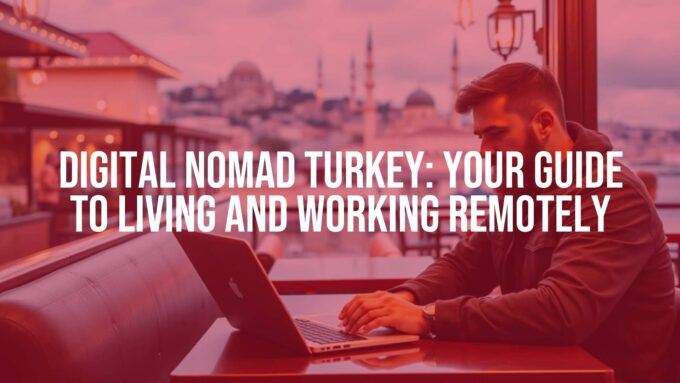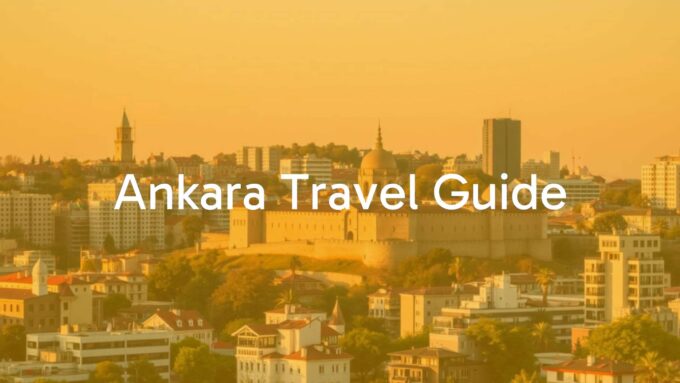Visiting Turkey in 2025 is seen as safe for most travelers, especially in popular places such as Istanbul, Cappadocia, and the Aegean coast. Areas close to the Syrian and Iraqi borders have higher risks because of ongoing unrest and security problems, but these places are far from main tourist routes. The Turkish government works hard to protect visitors, putting many security measures in place so tourists can enjoy the country’s history, scenery, and hospitality. Despite some regional problems and the occasional protest, everyday life in most tourist spots runs normally, and millions of visitors come to Turkey each year without problems.

Turkey Travel Safety Overview
Is Turkey Safe for Tourists in 2024?
As of September 2025, most travelers consider Turkey safe, especially in places tourists usually go. Istanbul was the world’s most visited city in 2023 with over 20 million visitors, showing how comfortable travelers feel there. Major cities and resorts have visible police patrols and stable conditions. Although Turkey has faced issues like political unrest in the past, these have not affected main tourist sites in a big way. Tourism is a key part of Turkey’s economy, so the government makes sure to prioritize tourist safety.
Still, no place is 100% without risk, and travelers should stay alert. Most tourist hot spots like Istanbul, Cappadocia, and seaside resorts are safe, but areas near borders can be less secure. Official advice often says to “use extra caution,” mainly because of the risk of terrorism or political protests. Even with these warnings, the vast majority of trips to Turkey go smoothly, and most visitors are pleasantly surprised by how safe they feel.
Official Travel Advisories for Turkey
Many countries’ advisories rate Turkey as requiring “extra caution.” For example, the U.S. State Department placed Turkey at Level 2, which means travelers should stay alert due to terrorism and the risk of being detained. Australia gives a similar warning. These advisories are updated from time to time. It’s important to know that while travel is generally allowed, some areas receive special warnings due to higher dangers. Areas near war zones are often under a “Do Not Travel” warning, which is a much stronger recommendation and usually means you should avoid these places entirely.
Safety by Region in Turkey
Turkey is a big country, and the level of safety can change a lot by area. Most advisories recommend staying away from Sirnak and Hakkari provinces and any place within 10 kilometers of the Syrian border. These areas have seen attacks, armed clashes, and unrest. Most incidents, such as bombings and ambushes, happen in these zones.
Major tourist destinations like Istanbul, Antalya, Bodrum, and Cappadocia are far from these high-risk areas and are visited by millions each year. Protests can happen in big cities, but authorities usually control them quickly, and tourist spots stay calm. Travelers should know what’s happening around them, avoid large crowds, and stay away from demonstrations. The Turkish government sometimes restricts travel in certain provinces, especially for its own staff, further showing that some regions are less safe than others. Knowing these differences can help you plan your trip safely.
Main Safety Risks and Concerns in Turkey
Terrorism and Political Issues
The threat of terrorism in Turkey is real, with different groups sometimes targeting busy places and locations often visited by tourists. Past attacks have included bombings and shootings at airports, public transport stations, markets, and hotels. Both Turkish and foreign targets have been affected. Tourists should always pay attention to their surroundings, especially in crowded areas, and stay up to date with local news.
Groups like Daesh (ISIS) and the PKK have carried out large-scale attacks, particularly in eastern and southeastern Turkey. While these usually happen in certain trouble spots, bigger cities like Istanbul and Ankara have sometimes been hit, though not as frequently. The Turkish government fights these threats with strict security, but caution is still needed. Watch local news for any new risks, and always take official advice seriously.
Demonstrations and Unrest
Protests and gatherings can take place in major cities and sometimes turn violent, even if they start peacefully. Police might use tear gas or water cannons to disperse crowds quickly, especially at demonstrations that aren’t approved. Even peaceful rallies can change without warning and may cause travel disruptions.
It’s safest to avoid any protest or large gathering. If you find a demonstration nearby, leave the area right away if you can. Just being near a protest could lead to being stopped or even detained by police, who have strict rules against criticizing the government, even online. Local officials can also set curfews or ban protests, which can affect your travel plans.

Crime: Theft, Scams, and Assaults
Turkey’s rates of street crime are low, but pickpocketing, purse snatching, and mugging are still risks in busy tourist spots like Taksim Square, Sultanahmet, and major markets in Istanbul. Only carry what you need and keep your valuables close. Crime also happens in some residential neighborhoods, especially on ground floors.
There are also scams targeting tourists, such as “bar scams,” where someone invites you out, then you end up with a huge bill and threats if you don’t pay. Fake taxi fares and counterfeit goods-especially carpets and jewelry-are other issues. Ask for official taxi meters, watch for pushy strangers, and use recommended shops and services. Sexual assaults have been reported, even against solo travelers, and sometimes involve drink spiking. Never leave food or drinks unattended, and be wary if offered anything from strangers. Report crime to the local police at 155 (for all emergencies dial 112) and notify your embassy if you need help.
Risks in Border Areas
Turkey’s borders with Syria and Iraq are among the most dangerous areas. Sirnak and Hakkari provinces, and regions close to the border, often see armed conflict, bombings, and unrest. Rockets and military operations are not uncommon in these areas. Kidnapping is also a risk there, and foreigners have been targeted.
The government has strict rules for travel near the border, especially for its own staff and foreign aid workers. Air travel is best when going to the southeast, and if you need to travel by road, do so only during the day on main roads and always follow instructions at police checkpoints. Do not use public transportation in these risky areas, as situations can be unpredictable.
Safety for Women and Solo Travelers
Women traveling alone should be careful, as harassment can happen, especially in conservative or less populated areas. Even in tourist places like Istanbul and Antalya, there have been reports of sexual attacks, sometimes involving new acquaintances or staff in places like hamams, spas, or taxis. Avoid sharing your accommodation or travel plans with strangers, never leave children alone in public restrooms, and use trusted services. Always report harassment or assault immediately to police (dial 112), the hotel, and your embassy. Get medical help right away if needed.
Natural Disasters and Environmental Hazards
Earthquakes
Turkey is in a region where earthquakes are common, especially along the North Anatolian fault, which is close to Istanbul. Strong earthquakes, including the 7.8-magnitude quake in 2023, have caused large-scale damage and casualties, especially in the southeast. Even areas far from the epicenter, like Istanbul, can feel strong shaking.
Visitors should know what to do in an earthquake: get under a sturdy table, stay away from windows, and wait until the shaking stops. If outside, move to open ground away from buildings and power lines. Aftershocks may happen for days or weeks. In coastal areas, move to higher ground after a large quake because of the risk of tsunami. Stay updated by following local news and instructions from hotel staff, guides, or authorities. You can also check information from Turkey’s Disaster and Emergency Management Authority (AFAD).
Floods, Droughts, and Wildfires
Turkey also faces other natural hazards, especially in certain seasons. Heavy rain can cause flooding and landslides, most often in the Black Sea region and some coastal areas, sometimes destroying roads and cutting off communities. Wildfires happen often in the summer, mainly along the Mediterranean and Aegean coasts, sometimes near resort towns. Fires can lead to poor air, travel delays, and road closures. It’s against the law to start fires or leave cigarettes burning in areas where wildfires are a risk.
Drought can affect water supplies in cities, so sometimes there may be less water available even in hotels. Travelers should be aware of weather reports, especially in high-risk seasons, and follow instructions from local officials in case of evacuation or restrictions.
Seasonal Weather Risks
Turkey’s climate changes from place to place and season to season. Summers (June to September) are hot and can bring heatwaves, especially inland. Drink water regularly and avoid being outside during the hottest parts of the day. In contrast, winter can bring rainstorms, floods, and snow, especially in the eastern regions. This can cause travel problems and delays. Always check the weather before your trip and be ready to adjust your plans if necessary.
Health and Medical Information for Travelers
Vaccinations and Health Tips
Before going to Turkey, make sure you are up to date on routine vaccines like Hepatitis A and B, measles, and typhoid. Some illnesses in Turkey can be caught from food or water, such as Hepatitis A and typhoid, so vaccines are advised. Malaria is a small risk from May to October in the southeast, and you may need malaria pills if you visit those areas.
Protect yourself against insect bites using repellent and by staying in places that keep bugs out. Avoid drinking tap water-stick to bottled or boiled water and avoid uncooked foods. There have been cases of bird flu in Turkey, so avoid contact with birds and animals. Keeping good hygiene helps prevent sickness while traveling.
Travel Insurance and Healthcare
It’s very important to have good travel insurance that covers medical treatment and possible evacuation, since medical care can be expensive and sometimes cash payment is required up front. In big cities like Istanbul and Ankara, hospitals are modern and well-equipped, but outside these areas, healthcare is more basic and help can take longer to arrive.
Check that the hospital or clinic you plan to use is approved by the Turkish Ministry of Health, especially if planning any medical treatment. Not all medical problems can be treated locally, and some serious conditions might need you to return home. Always make sure your insurance policy covers any planned medical procedures abroad.
Food and Drink Safety: Spiking and Alcohol Risks
There have been cases of methanol poisoning in Turkey, often from illegally produced alcohol. Methanol is dangerous and often impossible to taste or see in drinks. To stay safe, buy alcohol only from official stores, bars, or restaurants. Check bottles for proper seals and labels-bad printing or misspelled words can signal fake alcohol. Don’t accept food, drinks, or gum from strangers, and never leave your drinks unattended. If you feel unwell after drinking alcohol, see a doctor right away and notify the police.
Insect-Borne and Infectious Diseases
Besides general food and water safety, insect-borne illnesses like malaria, leishmaniasis, and Crimean-Congo hemorrhagic fever (CCHF) can be a risk in certain areas and seasons. Use insect repellent and wear long, light clothing, especially if hiking or camping. Other diseases like tuberculosis, typhoid, and rabies also exist in Turkey-make sure your vaccines are current, avoid stray animals, and get help right away if bitten or scratched.
Entry Rules and Local Laws
Prohibited Items and Drug Laws
Turkey has strict rules on what you can bring in and take out. Being caught with illegal drugs can result in long jail sentences or heavy fines-even for small amounts. This includes all drugs, and police use advanced technology to scan for them at airports.
Taking historical items or antiquities out of Turkey is illegal without special papers. Only buy such items from official dealers and keep certificates. If you buy or try to export an antique without the right documents, you could face arrest and several years in prison. Check the legal status before buying anything that looks old or unique.
LGBTQIA+ Travelers
Same-sex relationships are legal in Turkey, but may not be accepted everywhere, especially in conservative places. Public displays of affection may attract negative attention, and no specific laws protect against discrimination. At times, events or group activities connected to LGBTQIA+ rights are restricted by local authorities, so being discreet is safest, particularly outside big cities.
Dress and Behavior, Including During Ramadan
Turkey is a mix of modern and traditional. Dress modestly, especially when visiting mosques or religious sites-women should wear a headscarf, and everyone should cover arms and legs. In less touristy areas, conservative dress is more common, so following suit is respectful.
During Ramadan (expected to start around February 16-20, 2026), most people fast during daylight hours. Avoid eating, drinking, or smoking in public then. Loud music, dancing, and bad language are also best avoided. Shops and restaurants may open later or close earlier during Ramadan, so plan ahead. Always carry ID, such as a passport or residence permit, since police may ask for identification.
Safe Transport in Turkey
Driving and Road Conditions
Road quality in Turkey depends on the area. Highways near tourist spots are usually good, but rural roads can be in poor condition and poorly lit. Drive carefully, especially at night-watch for animals, holes, or roads without signs. Many road accidents result from fast or careless driving.
| Emergency Contact | Number |
|---|---|
| Police | 155 |
| Jandarma (rural areas) | 156 |
| Universal emergency | 112 |
For minor accidents, exchange insurance info, take photos, and fill in the Turkish-only accident form. If you don’t speak Turkish, or if someone is hurt, call police and wait. Don’t move the vehicle until police arrive. Drink-driving is strictly punished, and phones can’t be used while driving. Up to 180 days, foreign licenses or IDPs are accepted, otherwise you’ll need a Turkish license. Defensive driving is always recommended.
Public Transportation
Transport systems in cities-subways, ferries, buses, trains-are quite reliable. Buses and trains also connect most towns. In southeastern Turkey, avoid public transport due to security risks. In cities, watch out for pickpockets in crowded stations and transport hubs. Airports have higher security after past incidents, and lines can be long, so arrive early.

Taxis and Ride-Hailing
Taxis and ride-hailing services are easy to find in big cities. Always use registered cabs with working meters, especially going from or to airports. In rural areas, agree on the fare before starting. Avoid unlicensed taxis, as scams and crimes have been reported. Only get taxis through hotels or official apps, and make a note of the license number. Solo travelers, especially women, should be extra careful and let someone know their journey details.
Tips for Safe Travel in Turkey
Avoiding Scams
Tourists in Turkey can be targeted by scams. One common trick is being invited by a friendly stranger to a bar or restaurant, then facing an extremely high bill. Always visit well-known places, ask to see the menu first, and be wary of strangers being too friendly. Taxi drivers sometimes overcharge or take longer routes-always ask for the meter. Be careful when buying carpets or jewelry, and never send money to someone you only know online. Avoid exchanging money with strangers, as fake notes are a problem. Don’t accept food or drinks from new acquaintances.
Protecting Yourself and Your Items
Petty crime still happens, especially in busy areas. Keep your valuables close and avoid showing off cash or expensive things. Take only what you need for the day, and use hotel safes for extra security. Stay alert in crowds and avoid dark or quiet places at night. Use ATMs inside banks or malls, not on the street. Always carry ID for police checks but keep your passport safe.
Consider joining traveler alert programs like STEP for the U.S. or similar services in your country, so your embassy can contact you in an emergency. Know how to reach your embassy or consulate before your trip.
Important Emergency Contacts
- General emergency (police, ambulance, fire): 112
- Police (city): 155
- Jandarma (rural police): 156
- Istanbul Tourist Police: +90 212 527 4503
- U.S. Embassy (Ankara): 90-312-294-0000
Keep embassy contact information saved in your phone and written down, as embassies can help with lost passports, reporting crime, and emergencies.
Getting Travel Alerts
Sign up for your government’s travel alert programs, like STEP (USA) or Smartraveller (Australia). These send updates straight to your email or phone. You’ll be sent alerts about safety risks, local rules, and emergencies. Following your embassy’s social media or websites is another good way to get updates quickly.
Where Travelers Can Get Help in Turkey
Embassies and Consulates
Embassies and consulates help travelers with urgent problems, such as lost passports, reporting crimes, or finding a lawyer. The U.S. Embassy is in Ankara, with consulates in Istanbul and Adana. Australia and Canada also have embassies and consulates in Ankara and Istanbul. Find out the nearest one for your country before traveling. Note that embassies can’t pay your bills or get you out of legal trouble, but they will offer support in emergencies.
Steps to Take in an Emergency
If you find yourself in trouble:
- For police, fire, or medical help: call 112.
- Report any crime to the nearest police station and your embassy as soon as possible.
- For medical emergencies: go to the nearest hospital or dial 112.
- If you suspect drink spiking or poisoning, seek medical help without delay.
- In cases of assault or if you feel threatened, inform both police and your embassy.
- Have a plan and tell family or friends at home about your travel schedule.
- Follow local news and instructions during natural disasters or major incidents.
FAQ about Turkey Travel Safety
Questions often asked by travelers include:
- Is the political situation safe? – Turkey has occasional unrest, but tourist areas are usually protected by security measures.
- Is it safe for solo women? – Most women travel safely, but it’s best to stay alert and avoid isolated places, especially at night.
- What about terrorism? – While attacks have occurred, they’re usually far from tourist zones. Be watchful in crowded places and avoid protests.
- Are there natural disaster risks? – Earthquakes and wildfires happen, but tourist sites are generally well prepared. Know basic safety rules if an event happens.
- What local laws or customs should I follow? – Dress modestly, respect religious sites, and be more careful during Ramadan.















Leave a comment